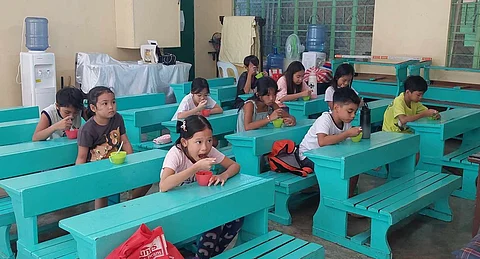
- NEWS
- the EDIT
- COMMENTARY
- BUSINESS
- LIFE
- SHOW
- ACTION
- GLOBAL GOALS
- SNAPS
- DYARYO TIRADA
- MORE

All kindergarten in public schools, not only the malnourished ones, are covered by the government’s school-based feeding program (SBFP) starting this school year, according to the chief of the World Food Program Philippines (WFPP).
Dipayan Bhattacharyya, deputy country director of WFPP, lauded the Department of Education’s (DepEd) decision to take the first step to implementing a universal feeding program during a press conference on inclusive education organized by the United Nations Philippines on 17 June.
Under the SBFP, wasted, stunted, underweight and nutritionally at-risk kids in vulnerable areas are targeted.
Last year, only 10 to 20 percent of public school children were covered by the SBFP, Bhattacharyya said.
“But now, all kindergarten children who are registered and attending public schools will be able to have access to nutritious food,” he said.
“Universal coverage of kindergarten is a very welcome step from the point of view of public school program. And we would love to continue working with the Department of Education to further go towards universalization, bringing in more efficiency and effectiveness in terms of how school feeding program should be delivered,” Bhattacharyya added.
The WFPP and DepEd, he said, are jointly piloting a school feeding program to gather evidences that will be presented to key decision makers in the country to convince them in supporting the gradual transition to universal feeding.
The SBFP provides grade schoolers with free hot meals and ready-to-eat foods like nutri buns, which are bread fortified with vitamins and vegetables, and other locally available food. There are also milk feeding days.
The program also benefits local small farmers and fisher folks who supply the ingredients for the hot meals and other food served to students.
In this way, Bhattacharyya said, “you invest not just into the children, your future generation, but also into your local economy.”
